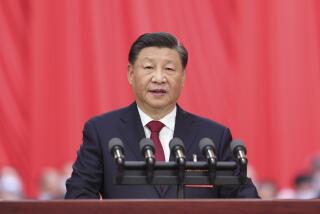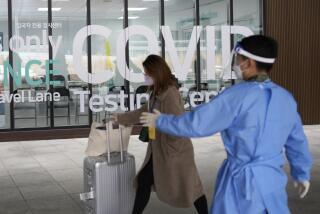As China’s Economy Has Changed, So Has Its Habits in Travel
- Share via
When attorney Tom Moore raced from his Hong Kong office to an urgent meeting in Shanghai early last year, he pondered one of the East’s more modern mysteries: Would Shanghai’s notorious gridlock make his cab ride from the airport longer than his one-hour and 45-minute flight from Hong Kong?
Moore now schedules his meetings in Shanghai and Beijing as he would in Los Angeles: at a hotel near the airport. But it is not only China’s roads that are clogged--train stations and airports are too, as China’s booming economy has come with a sea change in travel habits.
In 1996, more than 40 million Chinese have taken a flight within China. Domestic air travel has grown by 20% a year, on average, during the last decade and is expected to continue to grow at the same rate for the next 20 years.
To be sure, U.S. tourist and business travelers are finding amenities and travel services that didn’t exist in China as recently as five years ago. But with tens of millions of Chinese crisscrossing their country in record numbers, some old China hands lament the changes.
“It used to be foreigners had all kinds of privileges. People used to step aside, let you go to the head of the line,” said UC Berkeley sociologist Tom Gold, who has traveled to China often over the last 20 years. “Now the Chinese are paying customers too, so there is no longer any reason to give foreigners special treatment.”
Easing gridlock is said to be a top government concern. China is building its first highways to link its major cities--most of them toll roads. Twenty new regional air carriers have sprung up in recent years and new high-speed rail lines have shortened trips between cities--from five hours to 3 1/2 for Shanghai and Nanjing, for example.
But the infrastructure isn’t keeping up. Finding an empty seat on popular air or train routes such as Guangzhou to Beijing, Beijing to Shanghai and Shanghai to Guangzhou is often difficult, complicating last-minute travel plans.
On the other hand, China is rapidly modernizing, and getting to China from the U.S. is now much more convenient.
Direct flights link Beijing to Los Angeles, San Francisco, New York and Detroit. Because travelers no longer need to fly to China via Hong Kong or Tokyo, an automobile industry executive in Detroit can fly the 6,600-mile polar route to Beijing in 13 hours, only one hour longer than if he or she had left from Los Angeles or San Francisco.
Martin Chan, a Monterey, Calif.-based travel agent whose five U.S. offices booked more than 10,000 flights to China last year, says the real shake-up in the Chinese travel industry started in 1989, when droves of tourists and business people stopped visiting China following the Tiananmen Square massacre.
In the 1980s, foreigners had been so eager to travel to China, the Chinese took them for granted, Chan said.
“They once regularly bumped people from their seats, canceled flights and changed hotel reservations without regard to the passengers,” Chan said. “But in the 1990s, they’ve made a big effort to satisfy foreign visitors.”
Aside from the language barrier, Chan said, “it’s just as easy to travel in China as it is in other Asian countries.”
But is it as safe? As recently as two years ago, the International Airline Passengers Assn. called Chinese airlines an “ongoing disaster.”
Noting that 11 Chinese plane crashes occurred between 1992 and ‘94, the group warned, “Even if you’re enough of a daredevil to fly in Colombia on a stormy night, don’t fly in China.”
But air safety has significantly improved, according to Cindy Smith, a spokeswoman at Boeing Co. Training and new equipment--much of it from Boeing--has changed the picture, and there have been no major accidents in the last two years.
Many foreigners--as well as Chinese--still try to avoid flying on China’s domestic carriers or at least inquire as to the make of the aircraft before booking their flights. For instance, Chan said many of his clients refuse to take any flights on Russian-made Ilyushin and Tupolov planes still used on some Chinese domestic routes.
Gold said that after several “white-knuckle flights” he is less averse to a 72-hour train ride if necessary. “I fly in China as infrequently as possible,” he said.
Don Munro, a spokesman with American Express Corporate Services, advises business travelers to fly on U.S. carriers and to stay in U.S. hotels.
He said a key reason for this is that seats still cannot be confirmed on some Chinese regional carriers from the U.S. Passengers booking domestic flights before they leave may be surprised to find when they arrive in China that they do not have a confirmed seat.
Hilton, Sheraton and Holiday Inn are also more likely to have English-speaking employees and to provide interpreters, fax machines and other services that U.S. business travelers will need, Munro said. He also recommends that a business person inquire in advance whether an interpreter will be provided before arriving at their meeting.
More to Read
Sign up for Essential California
The most important California stories and recommendations in your inbox every morning.
You may occasionally receive promotional content from the Los Angeles Times.










